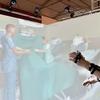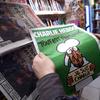Adam Gopnik appears in the following:
Adam Gopnik's New York Stories
Monday, October 20, 2025
New York's Gambling History
Tuesday, August 12, 2025
Adam Gopnik's Insomnia
Thursday, February 06, 2025
How to Learn 'New Tricks'
Monday, March 13, 2023
Words Will Never Hurt Me
Thursday, August 27, 2020
In Defense of Liberalism
Monday, May 20, 2019
The Pros and Cons of Impeaching Trump
Monday, March 11, 2019
Christmas Stories
Wednesday, December 27, 2017
The New Yorker's Adam Gopnik: Schubert in a Life
Monday, June 19, 2017
Transatlantic Hugs, Handshake Texts and the Future of Tactile Research
Monday, May 16, 2016
A Posthumous Manifesto from Charlie Hebdo's Editor
Thursday, January 07, 2016
The Tipping Point
Wednesday, October 21, 2015
Never Too Late to Learn to Drive
Thursday, January 29, 2015
Who is "Charlie Hebdo"?
Thursday, January 08, 2015
Exploring 3-D Sound with Adam Gopnik
Thursday, January 24, 2013
In his latest story for the New Yorker, staff writer Adam Gopnik explores the science behind the human experience of music. It all started when Gopnik realized a profound difference in the way he and his teenage children listen to music. While Gopnik and his peers grew up solemnly listening to long-form LPs on superb stereo systems, his kids "snatch at" smaller bits of music via earbuds and laptops. As he told Soundcheck's John Schaefer: "I would say, 'I can't listen to this on that lousy speaker on your computer!'"
A desire to understand this generational gap led Gopnik on a journey that spans rocket science, psychology and sociology, which he documents in his New Yorker piece, "Music To Your Ears: The Quest For 3-D Recording and Other Mysteries of Sound."
Gopnik describes visiting the lab of Edgar Choueiri, a rocket scientist determined to create a method of listening to sound in three dimensions. Choueiri allowed Gopnik to test out his “magic box” with a song of Gopnik’s choice: the Rolling Stones’ “Beast of Burden.” The experience, says Gopnik, was thrilling.
“[He] plugged it in,” he recounts, “And suddenly, there it was, Keith Richards is stabbing away with a cigar in his mouth you could practically hear on my right, and Ronnie Wood was plucking away in that kind of syncopated way he does…. Mick Jagger was somewhere right in front of me, and Charlie Watts passively was keeping time right behind my head. I had been inserted into the center of the Stones. It was a startling, uncanny experience.”
Adam Gopnik on the Meaning of Food
Thursday, November 22, 2012
Adam Gopnik on the Meaning of Food
Friday, November 16, 2012
Hollywood Violence Gets Real in Colorado Shooting
Friday, July 27, 2012
Central Park: An Anthology
Wednesday, July 25, 2012
Andrew Blauner, editor of Central Park: An Anthology, is joined by two of the collection’s contributors—author Adam Gopnik and Doug Blonsky, the senior executive responsible for managing and overseeing the park. They talk about the 843 carefully planned acres of Central Park and how it has made an impression on the 38 million annual visitors and on the lives and work of a diverse array of writers.
Guest Picks: Adam Gopnik
Wednesday, January 04, 2012
New Yorker writer Adam Gopnik was on the Lopate Show recently to discuss his latest book about food and how our ideas about food have been shaped. He revealed that he's a Justin Bieber fan and also told what his comfort foods are, even if he doesn't love the term itself.











